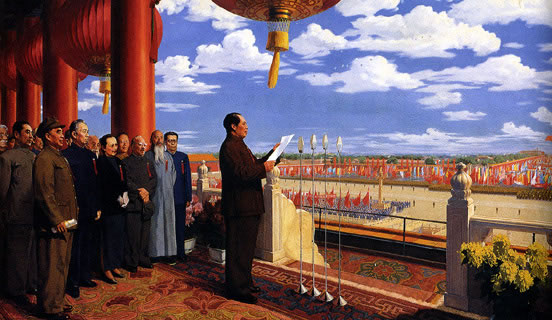Living Abroad in China

2006 © Stuart & Barbara Strother, from Moon Living Abroad in China. Stuart & Barbara Strother, and Avalon Travel Publishing. All rights reserved.
Excerpt :
Make Your Move to the Middle Kingdom
Despite Challenges, Working in China is a Rewarding Cross-Cultural Experience.
When we were offered the opportunity to take jobs in China, we had a comfortable Midwestern American lifestyle: a house in the country with a split rail–fenced yard where our twin two-year-olds chased our fat black cat. But when we got that call, it didn’t take much convincing to decide to trade the monotony of middle management for adventure in the Middle Kingdom.
Although we’d traveled in China on several occasions before, we were apprehensive about our move. We didn’t know if daily life in China would be as difficult to handle as we had always predicted, but we were willing to give it a try. As we made our preparations for the big move, our excitement grew. The thrill of experiencing a new culture and the opportunity to expose our boys to foreign worlds gradually overtook our fears of the unknown. We put our house on the market, got passports for the kids, and watched the movie Big Bird in China until we could sing along by heart.
As we settled into our new life in China, we delightedly found that more often than not, life is actually easier in China. Without the hectic American do-all-you-can-do schedule, life slows down considerably. With this slower pace, we found we could make frequent forays beyond our city to discover the innumerable fascinating spots within China.
Granted, life in China isn’t all rosy. The language poses an especially difficult hurdle, like the time we didn’t understand the salesclerk’s warning about the bad ice cream until our son vomited in the taxi on the way home, or the time we ended up in the city of Ninghai when we had asked for bus tickets to Linhai. Always getting the foreigner’s markup in prices gets old quickly, as does constantly being stared at and talked about.
But in our opinion the rewards far outweigh the hardships, and nothing is as rewarding as the friendships. We’ll never forget playing mahjong with coworkers until the wee hours of the morning. Or surprising and delighting old men at public parks when we ask to join in their xiangqi (Chinese chess) games.
To live here for an extended period of time, however, takes an incredible amount of flexibility and fortitude. If you are adventurous, if you genuinely like engaging people of other cultures, and if you can handle roughing it when you need to, then you may find your time in China to be one of the best times in your life. On the other hand, if you get stressed when things don’t go as planned or if you have high standards for cleanliness and service, it would be better just to enjoy China as a short-term travel destination. Don’t underestimate how much you may miss English books and magazines, your favorite foods, ice, drinkable tap water, western medicine, and above all, the simple ability to understand what’s going on around you. One recent figure put the percentage of expats returning home early as high as 70 percent.
Before making your move, visit these helpful websites:
* Living Abroad in China: www.LivingAbroadinChina.com
* China Blog List: www.chinabloglist.org
* China Expat: www.chinaexpat.com
* Expatexchange: www.expatexchange.comLearning Chinese
Chinese is one of the most difficult languages in the world to learn—but that doesn’t mean it’s impossible. The written characters seem incomprehensible at first, but after some study you’ll easily recognize many of them based on their pictographic roots. Thankfully, Chinese grammar is also very simple. It follows the same subject-verb-object pattern as English and there are no fancy verb conjugations, irregular verbs, or difficult past and future tenses. With enough study and practice, anyone can successfully learn to speak, read, and even write Chinese. Most Chinese will not expect you to be able to speak with them, so they’ll be surprised and delighted if you can communicate beyond simple greetings. Putting forth the effort to use their language sends a powerful message of respect and goodwill. If you took three years of college-level Chinese classes and learned everything, most people would consider you fluent. The benefit of learning in college is that you’ll learn all four language abilities: speaking, listening, reading, and writing. Textbook smarts and street smarts, however, are two different things. Whatever classroom instruction you receive should be supplemented with real-life conversations with native Chinese speakers. Most Westerners who are fluent in Chinese got that way only after studying Chinese in China diligently for at least two years.
Employment
China has the third-largest economy after the European Union and the United States, and foreign trade accounts for a third of China’s GDP. The per capita income is $1,368 per year, though a typical college graduate earns about $500 per month. That doesn’t sound like much, but with a cost of living 50-75 percent lower than the U.S. it goes a long way.
Thirty years ago, the first expatriate workers in China were English teachers employed by the universities. Today teachers still make up a significant part of the expat workforce, but the opportunities for foreigners wanting to work in China have widened considerably thanks to the economic boom that Deng Xiaoping’s reforms in the 1970s triggered. If you have a good attitude and can maintain your sense of humor, working in China will give you the kind of cross-cultural experience that today’s globally minded employers value.
The Job Hunt
The best place to find a job in China is to use your personal contacts who work for a company that needs someone with your exact skill set. If you aren’t blessed with such guanxi (connection), then the Internet will do. American and multinational companies advertise heavily on www.monster.com, while Chinese companies tend to use www.zhaopin.com, but you might need a little Mandarin to navigate this site. If you’re already in China, you can also check out the classifieds in your city’s English magazines. Such listings are more likely to be part-time or contract work.
Foreign-Invested Enterprises, as international firms are called, employ about 85 percent of the expat workforce who aren’t working as teachers. About 40 percent of the jobs have been in sales and marketing; about 20 percent in engineering; 10 percent in management, including accounting and finance; and IT jobs make up about 5 percent. Early on expats primarily worked for foreign firms, but more and more are hiring in at local firms, even the State-Owned Enterprises. About 15 percent of the non-teaching expats work for Chinese companies, primarily employed as engineers or managers in high-tech manufacturing firms. To a business, the ideal expatriate worker has the right mix of hard skills, soft skills, and language skills. Hard skills in demand include technical skills (including both IT and complex manufacturing processes), financial skills (including CPA credentials and expertise with GAAP), international marketing skills, and legal skills, especially lawyers familiar with international trade laws.
Having the right hard skills and credentials may land you an interview, but the soft skills like flexibility, maturity, people skills, and cross-cultural competency are what will help you secure a job offer, especially sales and marketing jobs that entail regular communication with Chinese customers. Not everyone can cope with the stress of living and working in a cross-cultural setting, so lots of expats end up going home before their contracted time is up. Human resource personnel know the average Joe won’t cut it in China, so expect to be scrutinized heavily before being offered the job. The best-paying jobs require a conversant level of Mandarin. Positions that require Mandarin fluency tend to pay as much as $30,000 more than the same job without the language requirement. Even if you aren’t quite fluent, any Chinese language ability will be beneficial in this job market.
Teaching
English teaching jobs or university teaching jobs tend to be filled via e-mail and telephone contacts with the school directly or through a placement agency. Some agencies, like Appalachians Abroad (based at Marshall University) match teachers with Chinese schools, provide pre-departure training, and only charge a modest fee for the service. On the other end of the spectrum, some organizations, particularly those with a religious affiliation, provide the same placement service but require that their teachers raise a significant amount of funds prior to placement in a Chinese school. Since these organizations typically provide teachers to Chinese schools under a volunteer or a low-pay arrangement, these funds will pay your living and travel expenses as well as health insurance, training, and ongoing support from the organization.
International school teaching jobs tend to be filled at the major job fairs each year in London (February and May), Vancouver (February), and Fairfax, Va., (June). Candidates need a government-issued public school teaching certificate and should plan on attending the fair to participate in on-site interviews. To search for international school positions on the Internet, try www.tieonline.com.
To land a position teaching English at a top university, you’ll probably need a TESOL certificate. Having a master’s degree isn’t necessary to get a teaching job but it will earn you anywhere from $100 to $500 more in monthly salary. English teachers have primarily worked in the colleges, but quite a few high schools and middle schools have started hiring foreigners as teachers now. There are also now a fair number of jobs at the new private language schools. Just be careful though, because a lot of these schools are new, unregistered, and unproven, so they might not provide you with stable employment.
Teaching at an international school in China is an excellent option for those who already have U.S. teaching credentials. The schools are run according to the home country standards, so if you have the appropriate college degree, and a teaching certificate from any U.S. state, you’re qualified to teach at an international school. Because the school pays for the teachers’ housing, they prefer to hire husband and wife teams.
Self-Employment
A few brave expat souls are seeking their fortunes as entrepreneurs in China. In such a booming economy where the heavy hand of government does not easily enter into the expat community, starting a business in China can be a rewarding experience. The difficulty with wanting to start a business in China is that if you aren’t already there, you’ll have no employer to get you a work visa. The best way around this is to get a “starter” job, or even register for a semester of classes as an exchange student, either of which will give you your entry visa. Then, once you are there, you can work on the legalities of getting your visa type switched when you need to—it’s easier to do it in person. With the western expat community in China fast approaching a quarter of a million people (most of whom live in just the three biggest cities), some of the best small business opportunities focus on serving this niche market. Another wide-open business opportunity is serving the Chinese population who are interested in your language and cultural expertise. Your native English-language ability might be your most marketable skill in China. With a little bit of business savvy, opportunities in tutoring, translating, or acting/modeling could certainly be developed into viable businesses. If you want a quick start, check out the Internet advertisements for English-language schools that are up for sale.
Cost of Living
The living standard for all Chinese people has risen dramatically in recent years, but unfortunately so has the cost of living. China’s three most cosmopolitan cities, Shanghai, Beijing, and Hong Kong, now rank as some of the most expensive places to live in the world—but this statistic is based on a comparable western lifestyle. Buying a car and a house with a yard in Chicago is much, much cheaper than doing the same in Beijing; but the difference is you don’t need to buy a car or a house in Beijing, and you can get by nicely with much, much less. Compared to the U.S. and Europe, living in China can still be a bargain. In the second tier cities, such as Tianjin, Hangzhou, or Qingdao, your cost of living will be about two-thirds lower than in Beijing, Shanghai, and Hong Kong, and in inland cities such as Chengdu and Xi’an you can easily live on less than half of what you’d need in the Big Three. Your lifestyle expectations will also greatly impact your cost of living. If you’re willing to live like the locals and don’t mind riding a bus or bike instead of catching cabs, eating noodles instead of steak, and taking trains instead of airplanes, the Middle Kingdom can be an incredible bargain.






